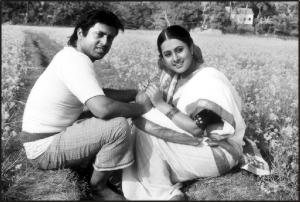Cine-review
Megher Pore Megh
A rich tribute to the Liberation War
Faizul A tanim and Syed Tashfin Chowdhury
The history of humanity teaches us at least two sad facts about war. One is that it brings tragedy. Another is it will be endlessly repeated.'--Anonymous.These are among the disconcerting truths that an individual is taught from the film Megher Pore Megh. This story depicts the post-war horrors of Bangladesh, a war-struck nation in1971. The movie, directed by Chashi Nazrul Islam, is based on Rabeya Khatun's book of the same title, and serves as a symbolic sequel to the other Liberation War movies. It creates an essential portrait of one Great War and the men who made the decision to fight for a Bangladeshi dream, but whose victories were mutated into a nightmare with the razakars (enemies of the state) of this nation still at large. The title Megher Pore Megh, itself depicts the cloud of sadness remaining even after our Independence. The story begins with the tale of a young man, in modern times, desperately trying to find out the truth about his real father from his aged mother (Purnima). The father could have been anyone from a freedom fighter to a Pakistani captain or even a traitor. Against this background, the movie focuses primarily on the story of two freedom fighters (a double role by Riaz) Sezan Mahmood and Majid, and their love interest, Suraiya (Purnima). It shows the war stricken scenario of a Bangladeshi village, where the pak bahinis (Pakistani military) were welcomed by the razakars. The razakars would aid their Pakistani alliance to find the whereabouts of Bangladeshi villagers, burn their houses, kill the men, rape the women, thereby wreaking total havoc in the village. In one such harrowing sequence, Majid's house is under attack. His father is killed and although he could escape the ordeal with his wife Suraiya, the razakars found his younger sister and brutally raped and killed her. This sparked a revolutionary flame in the otherwise 'mild' man and provoked him to join the Mukti Bahini. However, unfortunately, he is taken captive by the Pakistan force during a battle and spills the plans on the Mukti Bahini's next few missions. After escaping from captivity, and while on the run, Majid admits his betrayal to Sezan, and eventually is killed for the act. During his last breath, he asks Sezan to look after his family. Sezan, similar in appearance to Majid, takes up the duty of looking after his family, with Majid's very identity. He also takes it upon himself to re-build the rural community. He faces obstacles set by the once-Pakistani alliance, pretending to be freedom fighters at every step. The movie clearly defines how the Bangladeshis are still suffering from the gluttony and viciousness of the sadistic razakars--who shamelessly term themselves as sons of this very soil. Chashi Nazrul has been brilliant at portraying the story of a battle, through Megher Pore Megh. The scope of the film is much broader and has a refreshing view towards religion. For instance, a moulvi wearing a white prayer cap is usually the villain in the movie, sketching a picture of a razakar. However, Megher Pore Megh has broken this conventional idea and has portrayed a positive image, where a God fearing man actually helps to build a better Bangladesh. The movie also contains the character, Nishat,(played by Mahfuz Ahmed),a young village moulvi and best friend of both Majid and later Sezan. The movie stands out from all the other generic Independence-based movies, in the sense that it gives a realistic interpretation of the war. The challenges faced by Nishat, during his attempt to pay a lump-sum amount toward the improvement of the village infrastructure, shows the nobility of a religious man, which are otherwise absent from most other liberation war based movies. The character remains beside Sezan, whom he refers to as 'a true warrior' in the movie, till the very end. The character of Suraiya (Purnima) portrays the sacrifice and struggle of women during the war. In the film, she is allegedly raped by Pakistani forces--a wrong accusation made by the village chieftain. But later, her life lights up with the entrance of Sezan (identifying himself as Majid). Her marriage to Sezan later, is a testimony to how men and women can complement each other, unafraid of incurring the wrath of society. The film opens the doors for introspection by all Bangladeshis. In particular it gives our people the opportunity to compare their values and ethics, with those left as a legacy by the Liberation War veterans. The movie is still running to packed houses.
|

Riaz and Purnima in a scene from the film Megher Pore Megh |